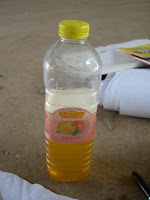.jpg)
Jambo! Simba and Pumba send their love from Africa! :)
After five weeks of traveling in Tanzania, Kenya, Ethiopia, and Dubai, I finally got a little taste of the motherland! My final trip was nothing short of incredible. The highlights were definitely Zanzibar (an island off the Tanzanian coast) and the safari in Manyara and Ngorongoro Crater, Tanzania. We saw so many animals that the Lion King would have been put to shame! It was amazing to see the impalas, zebras, giraffes, and elephants all grazing and roaming together. Then we sighted the lions, cheetahs, and the endangered black rhino from afar. We saw a week-old hippo sunbathing with its parents at the Crater. :) Zanzibar was rife with amazing seafood, beautiful beaches, and alleyways to get lost in. The highlights of Kenya were feasting on crocodile and ostrich at Carnivore and visiting a kid whom I’m sponsoring through Compassion International (http://www.compassion.com/). I loved seeing his home, his center, his grandmother (I think his parents died from HIV/AIDS), and the hope of his future. I spent the latter two weeks in Ethiopia which was an adventure for us. We traveled the historic route in the northern region; toured ancient sites including monasteries, Gondar castles, rock-hewn churches, and the alleged Ark of the Covenant. Dubai was clean, expensive, and hot, but I didn’t make my way into the seven-star hotel nor dig my hole on the man-made island.
 Gondar, Ethiopia: Castle
Gondar, Ethiopia: Castle.jpg)
Bahir Dar, Ethiopia: Priest showing ancient document
.jpg)
Zanzibar, Tanzania
.jpg) Ngorongoro Crater, Tanzania: Week-old hippo with parents
Ngorongoro Crater, Tanzania: Week-old hippo with parentsThen it was time to make my way home. I actually got back early August and was laying low for awhile while familiarizing myself with the environment. My father asked me to write a final update about my readjustment experience after being away for two years, and I thought, “How do I write about being home that’s home to everyone else?” I may not be doing my reentry experience much justice, but I thought I’d give it a shot.
People always ask me, “What’s it like being back?” And I always tell them that the reverse culture shock isn’t what I thought it’d be – a shock. The smallest, subtlest things are what take me on by surprise. Like getting lost in Oakland trying to get back onto the freeway. Or seeing the new buildings that suddenly materialized on the Berkeley campus. Or absorbing all the new information about my friends' lives over the last two years. Or feeling that all the things that were once familiar are not so familiar anymore. Sometimes I feel like an alien in my own home.
And then there are the unsubtle things. Like how I lost my appetite for a month, because I realized that there were tons and tons and tons of food! Just looking at them makes me full. Everything here also involves so many options. When faced with too many options, I can't make up my mind. Should I get beef, chicken, pork, or all of the above? And the flat screen TV in our home. For the first time in my life, I have over 10 channels! The pace of life is so different here. People are always in a rush to get somewhere, anywhere. Then there’s the economic recession. My junior high was closed down but my high school just finished remodeling. And there’s no greater way to welcome me home than a 9.75% tax rate.
But I do have to say that it’s good to be home. The best thing about being home right now is being able to breathe in the ocean and take a hot shower every morning - even if it’s summertime! And of course meeting up with friends and family and seeing how we’re all two years older. :)
I’ve finally managed learn to give a 15-second answer about my last two years’ experience as “amazing, hard, and life-changing” and narrowed down viewing my thousands of pictures to 400. But it doesn’t take away the place Malawi left in my heart. When I’m not busy figuring out my life or readjusting, I’d start missing my nursery babies and my agogo, and I’d wonder when I’ll ever see them again. Mostly what I miss most is the simplicity of life in Malawi. Since I have been back, I have been eating A LOT on the food I’ve missed out the last two years (yay for In ‘n’ Out!) and preparing for my future endeavors. J I’ve been working a part-time job (while looking for a full-time job in the public health field) and applying for masters programs in public health for next year. I can’t wait to start learning more about all things public health. J I know this update is way overdue, but I did want to let you all know that I’m back! I’ve finally uploaded some more pictures for your viewing at http://www.flickr.com/photos/26853368@N04/, but unfortunately I reached my limit so I was unable to upload more pictures from my trip. (If any of you decide to travel eastern Africa, do let me know!) I would also love to meet up with you and share my experiences, as well as to catch up on the last two (or more) years! Maybe I can entertain some of you with a video of "preparing" a chicken Malawian style.
Well... this will be my last update. Sometimes I still can't believe that I'm back! It really has been one great adventure. I look forward to hearing from you soon!
Much Love,
Elaine
P.S. World Food Program went on the road to see Malawi and you can get a glimpse: http://www.wfp.org/on-the-road/malawi













 Youths chucking bricks
Youths chucking bricks.JPG)


